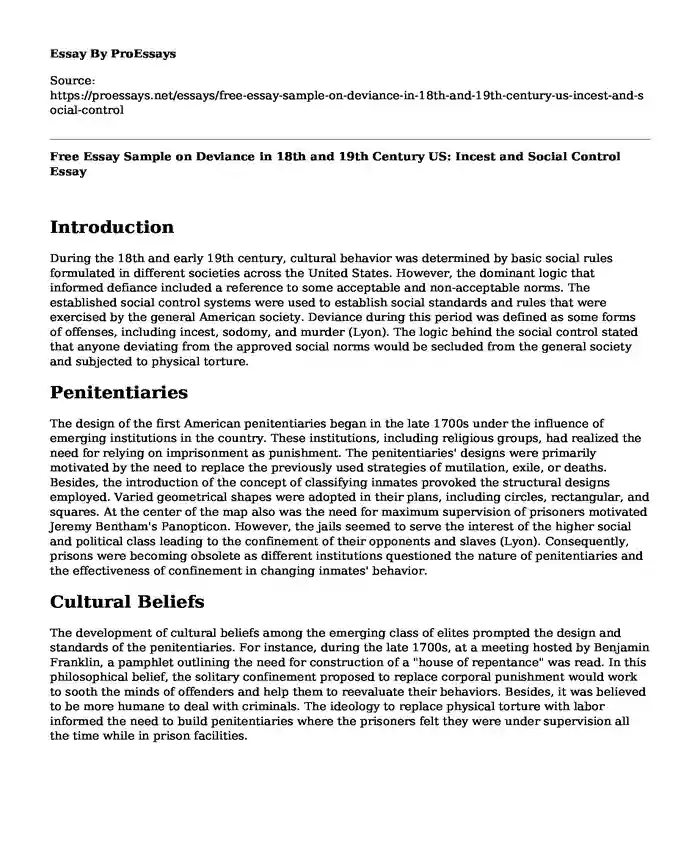Introduction
During the 18th and early 19th century, cultural behavior was determined by basic social rules formulated in different societies across the United States. However, the dominant logic that informed defiance included a reference to some acceptable and non-acceptable norms. The established social control systems were used to establish social standards and rules that were exercised by the general American society. Deviance during this period was defined as some forms of offenses, including incest, sodomy, and murder (Lyon). The logic behind the social control stated that anyone deviating from the approved social norms would be secluded from the general society and subjected to physical torture.
Penitentiaries
The design of the first American penitentiaries began in the late 1700s under the influence of emerging institutions in the country. These institutions, including religious groups, had realized the need for relying on imprisonment as punishment. The penitentiaries' designs were primarily motivated by the need to replace the previously used strategies of mutilation, exile, or deaths. Besides, the introduction of the concept of classifying inmates provoked the structural designs employed. Varied geometrical shapes were adopted in their plans, including circles, rectangular, and squares. At the center of the map also was the need for maximum supervision of prisoners motivated Jeremy Bentham's Panopticon. However, the jails seemed to serve the interest of the higher social and political class leading to the confinement of their opponents and slaves (Lyon). Consequently, prisons were becoming obsolete as different institutions questioned the nature of penitentiaries and the effectiveness of confinement in changing inmates' behavior.
Cultural Beliefs
The development of cultural beliefs among the emerging class of elites prompted the design and standards of the penitentiaries. For instance, during the late 1700s, at a meeting hosted by Benjamin Franklin, a pamphlet outlining the need for construction of a "house of repentance" was read. In this philosophical belief, the solitary confinement proposed to replace corporal punishment would work to sooth the minds of offenders and help them to reevaluate their behaviors. Besides, it was believed to be more humane to deal with criminals. The ideology to replace physical torture with labor informed the need to build penitentiaries where the prisoners felt they were under supervision all the time while in prison facilities.
Conclusion
Behind the process and structural designs were two important institutions, political and religious institutions. The former was motivated by the need to maintain harmony in society through the behavior change mechanism of offenders (Lyon). On the other hand, religious institutions, especially under the influence of the Catholic Church, were interested in changing the previous primitive methods of punishment.
Works cited
Lyon, David. "Bentham’s Panopticon: From Moral Architecture to Electronic Surveillance." Surveillance, Crime and Social Control. Routledge, 2017. 13-34.
Cite this page
Free Essay Sample on Deviance in 18th and 19th Century US: Incest and Social Control. (2023, Nov 02). Retrieved from https://proessays.net/essays/free-essay-sample-on-deviance-in-18th-and-19th-century-us-incest-and-social-control
If you are the original author of this essay and no longer wish to have it published on the ProEssays website, please click below to request its removal:
- Michael Brown Shooting Case Study
- Essay on Dunkirk: 400,000 Soldiers Trapped, Hope Evaporates
- Essay Sample on Immigrant's Journey to the American Dream
- Prison Abolition: A Call to Prevent Crimes, Not Cure Them - Essay Sample
- Social Inequality & Conflict Theory: Understanding Inequality in Society - Essay Sample
- The Columbian Exchange: Uniting Old and New Worlds - Essay Example
- Exploring a New Culture: Adapting to an Unfamiliar Location - Free Essay Example







